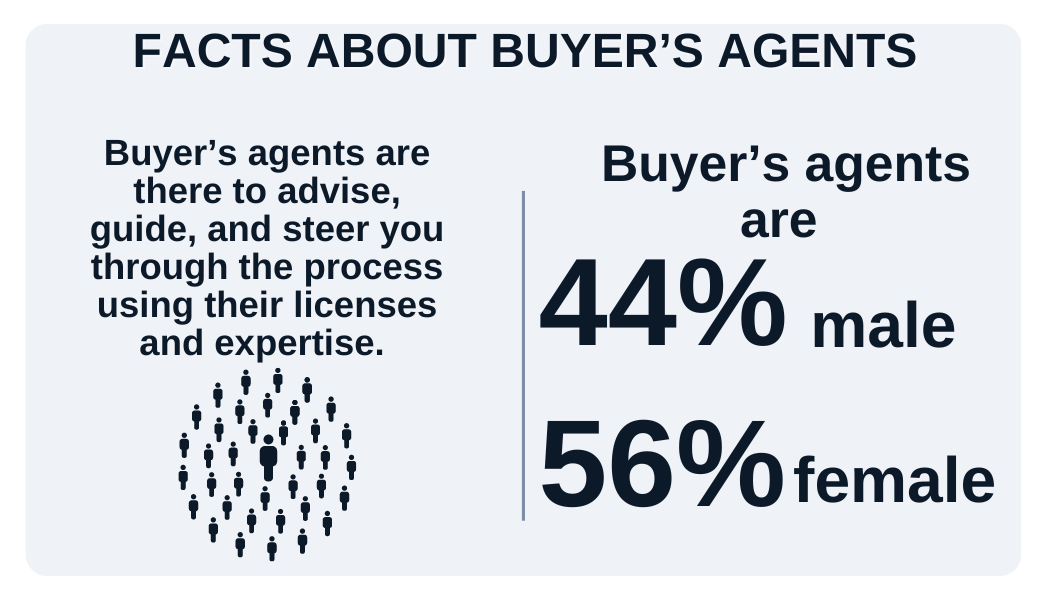Buyer's Agent Statistics
Are you looking into buyer's agents and wondering what they do and if you should use one? Keep reading to learn more about buyer's agents and the statistics.
A buyer's agent is a professional in the real estate industry who helps homebuyers navigate the local housing market and find a property that meets their specific needs and preferences. As the primary guide throughout the home buying process, a buyer's agent plays a crucial role in driving your home purchase.
The process of buying a home, from searching for the right property to closing the deal, can be a lengthy and complex process. Whether you are a first-time homebuyer or searching for your dream home, a buyer's agent can provide valuable assistance in navigating the home-buying world.
A buyer's agent can help you find potential homes, communicate with sellers and other agents, and represent you during the home-buying process. They act as your guide, ensuring that your interests are protected and showing you properties that meet your preferences.
There are many statistics relating to the real estate industry because it is an ever-evolving landscape. This industry can be hard to keep up with and predict; thankfully, agents stay on top of all the different trends and factors, so if you are interested in buying a home, get in touch with a trustworthy agent to help you with this process.
Here is what you should know about buyer's agents.
1. What Is A Buyer's Agent
A buyer's agent is a professional who represents the purchaser's interests in a real estate transaction. These professionals play a different role from listing agents. Most residential agents work with both buyers and sellers, but there are agents who will act on only the buyer's side.

Buyer's agents work closely with the clients to understand their needs and preferences while conducting research and analysis to provide them with a perfect list of potential homes. These agents represent the client in all negotiations with the seller agent, coordinate property inspections and appraisals, and manage all aspects of the buying process.
Remember that real estate agents can represent more than one client, so you may encounter a buyer's agent who also represents a seller. There are many benefits to working with a buyer's agent, especially if this is your first time home buying. Make sure you do your research to find the perfect match for you.
2. Buyer's Agent Demographics
Understanding the demographics of buyer's agents will help not only future buyer's agents but also the clients. Below are some buyer's agent demographics and statistics in the United States.
| Buyer's Agent Gender Ratio | Male: 44% / Female 56% |
| Average Buyer's Agent Age | 47.6 years old |
On the other hand, the most common degree for buyer's agent education is a bachelor's degree, with 64% of buyer's agents earning that degree. The second and third most common degree levels are associate degree (18%) and High School diploma (7%).
Demographics such as population growth, age, and household income play a significant role in determining housing demand and property values. By analyzing these patterns, you can gain valuable insights into the market, and as a home buyer, you can find the right match to assist you with this significant transaction.
3. What A Buyer's Agent Does

A buyer's agent guides you through the overall home-buying process. Other than that, a good buyer's agent will also:
- Find Homes for Sale: Help you understand the type of home you can afford in the current market, find homes that match your needs, and narrow down the options worth considering.
- Set up Tours: Scrolling through listing photos is not the same as viewing the home in person. Your agent will work with the listing agent or owners to schedule showings and fill you in on anything they have learned about the property and sellers.
- Know the Area Inside and Out: If you are not a local, the buyer's agent will provide you with all the inside scoop on the neighborhoods, schools, zoning, taxes, and many things you would not know.
- Help Make Offers: After you find the perfect home, the agent will advise you on how much to offer and what contingencies to include in the contract based on the market and property. The agent should explain the contract terms, answer any questions, and help you through this process.
- Negotiate with Sellers: The agent will inform you of the seller's response to your offer and advise you on the next steps, such as either accepting or negotiating the price and terms.
- Refer You to Others: A buyer's agent can also refer you to other professionals such as real estate attorneys, movers, inspectors, and other things in the real estate industry.
As a buyer's agent or any real estate agent, finding the best home for clients is crucial. It can be pretty challenging, especially in situations where multiple offers are made. If an offer is too high, an agent can recognize that and prevent you from making a wrong decision. Agents are experts in this field, so taking their advice can be vital in a multiple-offer situation.
A skilled buyer's agent can help you figure out the hidden costs associated with purchasing a home that you may not be aware of. Therefore, taking advantage of their expertise is highly recommended, as it will benefit you greatly in the long term. Making the correct decision when buying a home is crucial, especially so if you are a first-time homebuyer who has yet to experience this process.
4. Buyer's Agent Vs Listing Agent

A buyer's agent differs from a listing agent in many ways. While both are real estate professionals who are involved in real estate transactions, a buyer's agent represents the buyer and their best interest. In contrast, the listing agent represents the seller and their best interests.
A listing agent works for the seller to minimize contingencies and maximize profit from the sale. At the same time, the buyer's agent negotiates the best deal on the home and ensures that the contract contains protections for the buyer. So, whatever side you are on in the transaction, you have a professional there to help you through the process.
5. Pros and Cons of a Buyer's Agent
Before you decide whether to work with a buyer's agent, it is essential to understand the advantages and disadvantages.
Pros:
- They represent your best interest
- They are real estate experts
- They can help spot potential issues
- Find the perfect home that meets your needs
- Know the area better
- Workaround offers and protects you as a buyer
Cons:
- You could be locked into a buyer agency agreement
- You may have trouble finding the right agent
There are not many cons to having a buyer's agent, which is a good thing. Buyer agents are there to help you and focus on you and what you want. If you are wondering if you should use a buyer's agent, the answer is yes. Having help, especially in our competitive housing market, is important.
6. Questions to Ask Buyer's Agents

Once you have found a few agents who seem like they would be a good fit for you, set up an informal interview. If an agent doesn't have time for this, then keep looking. Buying a home is a major transaction and can be a long process, so you want an agent with whom you will be comfortable in the long run. Here are some questions to ask potential agents.
- Availability and Schedule: Are they full-time? Side hustle? This helps you find how they manage their time and priorities.
- Communication and Working Style: Do they prefer phone or text? Will you work directly with an agent or the assistant? How often will you hear from them?
- House Hunting: How will they find homes in your price range? What strategies do they use to guide buyers in a competitive market? What location do they work in the most?
- Making Offers and Negotiating: How will the agent help you make competitive offers and negotiate with sellers? What challenges could you find in your local market?
- Thought and Feels: Does the agent's interpersonal style mesh with yours? Is this someone you trust?
Also, do not be afraid to ask for references. Request names of a few clients who recently within transactions with them and ask those customers about their experience. This is your home-buying process, so make sure you find the buyer's agent for you.
7. Real Estate Statistics in 2024
The real estate industry is always evolving, and sometimes it is hard to keep up with it and all the emerging trends. Since it is such a fast-paced industry, conducting research and looking at current statistics is important to help you understand the real estate world and the housing market.
- The Association of Real Estate License Law Officials estimates that there are over 3 million active real estate licensees in the United States
- The typical home seller has been in their home for an average of 8 years
- 86% of members of the NAR use their own listing, 70% have information about buying and selling, and 66% have a link to their firm's website
- 89% of buyers purchased their home through a real estate agent or broker
- 90% of buyers would use their agent again or recommend them
- Out of first-time home buyers, 70% were young Millennials, and 46% were older Millennials
Methodology
We used information from different sources and our data to create this guide about buyer's agents and the statistics. There were various data to use, so we put them together to help you understand buyer's agents.
- National Association of Realtors
- US News Real Estate
- U.S. Bureau of Labor Statistics
- North Carolina Real Estate Commission
Above are a few sources we used to gather most of our information about buyer's agents and the statistics.

FAQS
How many agents do buyers interview?
According to the National Association of Realtors, 71% of buyers interviewed at least one real estate agent during their home search, while 90% of buyers will use their agent again or recommend their agent.
What is a buyer's agent fee?
A buyer's agent fee is the commission a buyer makes when they help someone purchase a home. This compensation is typically split between the buyer's agent and their real estate broker.
Do you have to have a buyer's agent in North Carolina?
In North Carolina, a Buyer Agency Agreement has traditionally been required before a contract can be drawn up. However, with new changes taking effect in mid-July 2024, this agreement will need to be in place before any property showings.
Can NC Realtor represent both the buyer and seller?
Yes, Duel Agency is legal in NC as long as both parties, the buyers and sellers, have provided written authorization for the agent to represent both parties in this transaction.
Buyer's Agent Statistics - The Bottom Line
A buyer's agent is a professional who represents the interests of a purchaser in a real estate transaction. These professionals have a different role from listing agents. While most residential agents work with both buyers and sellers, there are agents who specialize in representing only the buyer's side.
One of the great attributes of buyer's agents in a local market is the network they bring to the table. The agent or firm will have a large network of different listing agents, which allows them to contact the listing agent for any specific questions about a particular property.
By knowing the listing agent, they can also get information on a certain home before it hits the market. Before it hits the Multiple Listing Service, the agent may be able to obtain some early information on it to determine if it's worth checking out.
If you are considering moving or selling, contact us or visit our website. Our team at Raleigh Realty is here to help you with any home buying or selling needs.




